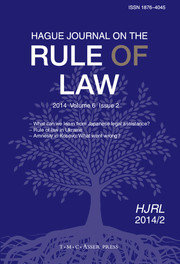Article contents
Bringing Justice to the Poor, Bottom-up Legal Development Cooperation
Published online by Cambridge University Press: 12 October 2012
Abstract
In the last decade bottom-up approaches to legal development cooperation have become increasingly popular. Examples are reform ideas and programmes using concepts such as ‘access to justice’ and ‘legal empowerment.’ These approaches share a common concern that legal interventions should benefit the poor, and that their needs and preferences should form the basis for legal reforms. Proponents argue that these approaches are important alternatives to ineffective pre-existing legal reform practices which were based on ‘the rule of law orthodoxy.’ This paper critically discusses the content, context and merits of such bottom-up approaches. It concludes that while these approaches offer advantages, they should not substitute but complement pre-existing legal development cooperation practices and the rule of law paradigm on which they are based. The emergence of these new approaches shows how much legal development cooperation is a field of trends, where doubts about their effectiveness force legal reformers to regularly shift from one paradigm to the next, enthusiastically applauding the seemingly new, while sacrificing the caricaturized old.
Keywords
- Type
- Articles
- Information
- Copyright
- Copyright © T.M.C. Asser Press and the Authors 2012
- 8
- Cited by




